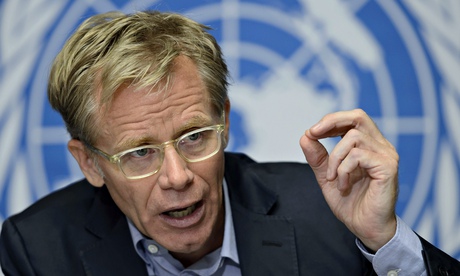 |
The WHO's assistant
director-general Bruce Aylward estimates the Ebola outbreak in Liberia
will require help from 750 international volunteers. Photograph: EPA
|
The UN health agency said the outbreak is accelerating in west Africa,
where the death toll has now reached 1,552, and it believes the numbers
who have been hit by Ebola could be two to four times higher than the
current 3,069 cases currently reported.
"[It] is a scale that I
think has not ever been anticipated in terms of an Ebola outbreak," said
Bruce Aylward, assistant director general of WHO.
He said the increase came from cities including the Liberian capital Monrovia, where a slum was quarantined last week, leading to food shortages and civil unrest.
"It's
really just some urban areas that have outstripped the reporting
capacity," he said. Up to now most efforts have concentrated on rural
areas close to the Guinea border. His remarks come as Medecins sans
Frontieres said it was struggling to cope with the caseload in Monrovia.
MSF has just opened a new Ebola hospital in the Liberian capital and
after one week it's already at capacity of 120 patients.
"The
number of patients we are treating is unlike anything we've seen in
previous outbreaks," said Lindis Hurum, MSF's emergency coordinator in
Monrovia. "This is not an Ebola outbreak, it is a humanitarian emergency
and it needs a full-scale humanitarian response."
The Ebola
outbreak started in Guinea in March and is the 26th since 1976 when the
virus was first identified, but is widely recognised to be out of
control.
"It is simply unacceptable that, five months after the
declaration of this outbreak, serious discussions are only now starting
about international leadership and co-ordination," said MSF director of
operations Brice de la Vigne.
MSF said the number of people
seeking care at its new Monrovia centre is "growing faster than we can
handle both in terms of the number of beds and the capacity of the
staff". It said patients are coming from nearly every district of the
city and healthcare workers were "struggling to screen new arrivals,
care for admitted patients, safely remove dead bodies and transport them
to the crematorium".
It said it is so overwhelmed it can no
longer administer intravenous treatments. MSF has five field hospitals
in west Africa, plugging a gap left by the fragile health care systems.
It says most of the medical facilities in Monrovia have shut down over
fears of the virus among staff, leaving many people with no healthcare
at all. This is leading to fears of a secondary health crisis with
expectant mothers and malaria patients now going untreated too.
Tom
Dannatt is founder of British charity Street Child, which has 650
volunteers in two of the worst stricken countries, Sierra Leone and
Liberia. He says the catastrophic spread was not to do with the strength
of the virus but the lack of "anti-Ebola measures" being put in place.
He also said a food aid programme to help feed those in quarantined
areas in eastern Sierra Leone is completely inadequate.
"They are
providing food for a standard World Food Programme five heads per
household. But in Sierra Leone there are 12 to 15 people living in the
majority of households," said Dannatt. He is offering to lend Street
Child's workers to government task forces to help contain the disease
and is launching an emergency appeal later this week.
Dr Anthony
Fauci, director of the US National Institute of Allergy and Infectious
Diseases told the Guardian that containment could be achieved by "low
tech public protection measures".
"What we have here is porous
borders, poverty and big cities. It is the perfect storm. What we need
is a massive influx of resources from WHO, from the US, from the UK," he
said.
WHO said it is launching a new $489m (£294m) initiative to try to contain Ebola within six to nine months.
Aylward
said it would require the assistance of 750 international workers and
12,000 national workers. He urged airlines, including British Airways,
Air France and Gambia Bird, who have suspended flights to the affected
countries, to restart services.






0 komentar:
Post a Comment